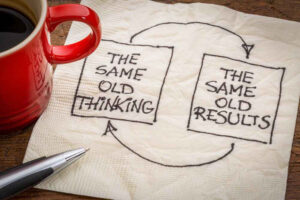“When it comes to life, the critical thing is whether you take things for granted or take them with gratitude.” – G. K. Chesterton
I remember at a very young age the constant urging of my parents to always say “thank you” in response to any kindness or friendly words shared in my direction. For many years, I saw this advice from my parents as simply good manners and what people were supposed to do. In my mid-teen years, I was mature enough to observe the heartfelt sincerity my parents always showed when they said “thank you” to others, offered prayers of thanks or expressed appreciation for the simple blessings in their lives…and how different it was from my perfunctory use of the words. They really meant it and I began to understand that their use of “thank you” transcended mere courtesy and it clearly meant something much more meaningful and powerful to them. What I observed my parents practicing so well was the beginning of my deeper understanding of the word gratitude.
My parents were wonderful role models and teachers in many ways and helping me learn to be grateful was an amazing gift that I work at demonstrating every day. My wife and I try very hard to model a life of gratefulness for our sons and for those we encounter each day and we know this ongoing effort has absolutely transformed us.
What are other fruits that result from being grateful?
1. We desire less when we are truly grateful for what we already have in our lives.
2. People grateful for what they have act with more generosity to those in need.
3. Gratitude requires a positive frame of mind, which contributes to greater overall happiness. There cannot be happiness without gratitude.
4. If we invest in consistently practicing gratitude with others, we can see a ripple effect as those experiencing our gratitude pay it forward to the people they encounter.
5. We positively impact and grow our relationships with a grateful attitude.
6. Gratitude is a healthy substitute for resentment, envy, jealousy and greed. See point number one.
How has gratitude manifested itself in your life? Many people, myself included, find it challenging to consistently act with gratitude. The great writer G. K. Chesterton observed that, “Gratitude, being nearly the greatest of human duties, is also nearly the most difficult.” What are best practices we can follow to help us be more grateful?
Gratitude Best Practices:
- Try to be grateful for our challenges, not just our blessings. Try looking at adversity as a source of helpful lessons rather than frustrating burdens to carry.
- Express gratitude at every opportunity. “I am grateful….” “I appreciate…”and a simple “thank you” can never be overused and should be shared throughout the day when an appropriate opportunity arises.
- Make it memorable. Send a handwritten note of gratitude whenever possible.
- Be intentional. Place a reminder on the calendar each Friday morning to express gratitude for the people and blessings we have experienced during the week.
- Be grateful for EVERYTHING. “Cultivate the habit of being grateful for every good thing that comes to you, and to give thanks continuously. And because all things have contributed to your advancement, you should include all things in your gratitude.” – Ralph Waldo Emerson
- Always give thanks to God. Be grateful to God for the gift of our lives, for air in our lungs, the shining sun on our faces and for all Creation. Share this gratitude in prayer throughout the day. “God’s generous presence in our lives lays claim to a form of gratitude that is never satisfied by the mere recitation of thanks, but requires us to express our gratitude in action. The kind of gratitude that God is hoping to find is one that includes a bond of friendship and a commitment to service.” – author Donald DeMarco
As we consider how to go about living our lives and interacting with those we encounter each day, why not choose the gratitude approach? Make the commitment and watch your life absolutely change for the better.
Live gratefully and you will never regret it.






